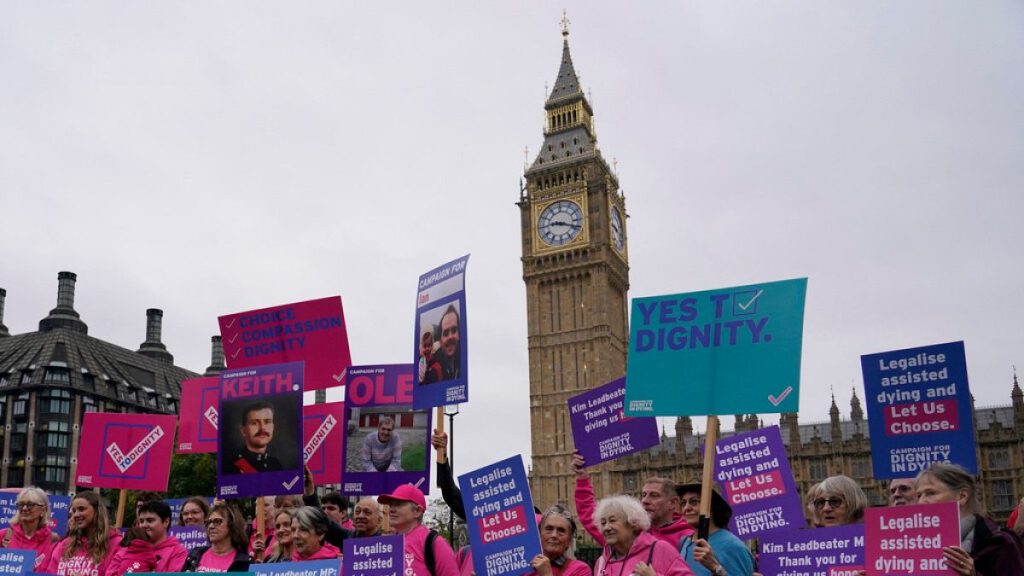The recent vote in the United Kingdom’s Parliament on a historic assisted dying bill has ignited a passionate and divisive debate among lawmakers, cutting across traditional party lines. Introduced by Labour MP Kim Leadbeater, the legislation aims to allow terminally ill adults with a prognosis of less than six months to seek assistance in ending their lives, provided that two medical professionals and a judge approve the request. This bill received considerable support during its second reading, securing 330 votes in favor against 275 opposing votes after an intense five-hour discussion. While this vote marks a significant milestone in the legislative process, it is merely the first of many steps in a journey that promises further scrutiny and debate over the coming months.
The nature of the assisted dying bill has led to a “free vote,” meaning Members of Parliament (MPs) were not obliged to align their votes with their respective parties. This has not only revealed stark divisions within party lines, but it also brought unexpected alliances and unusual pairings among political figures. The issue has transcended typical party politics, generating a landscape where MPs find themselves at odds with their own colleagues. Notable among these complexities is the stance of Health Secretary Wes Streeting, who, despite anticipating his role in potentially implementing the bill, has publicly opposed it. He emphasized the inadequacies of the UK’s end-of-life care system, expressing concerns that the bill could detract from existing medical services within the beleaguered National Health Service.
As debates unfold, the conflict of opinions extends beyond current MPs, as former Prime Ministers exhibit varying perspectives on the matter. While Boris Johnson and Theresa May have indicated their opposition to the bill, David Cameron has publicly changed his stance, announcing his support through an opinion piece in a national newspaper. These divergences point to the intricacies involved in moral and ethical considerations surrounding assisted dying, with many MPs continuing to weigh the benefits and potential risks of the proposed legislation. Leadbeater has defended her bill rigorously, asserting stringent criteria that would allow only adults over 18 with the mental capacity to make informed choices about their dying process to seek assistance.
In an effort to combat the stigma associated with terminal illness and bodily autonomy, Leadbeater articulated her viewpoint, likening the push for assisted dying to movements for women’s rights and abortion access. She believes that societal attitudes will evolve over time and anticipates that future generations will reflect on the decision-making process surrounding this issue with a sense of disbelief over its delay. The notion of self-determination in end-of-life scenarios resonates with many advocates, who argue that individuals facing terminal conditions should be afforded the dignity to make choices about their own bodies and fates.
Looking ahead, should the bill receive the necessary endorsements from both Houses of Parliament, its implementation may occur within two to three years. The legislation’s future is uncertain as it is set to encounter rigorous debates and evaluations in the legislative arena, mirroring discussions in other parts of Europe and North America. Recently, legislators in Ireland have also indicated a willingness to explore the notion of assisted dying, while various countries including Austria, Belgium, and Canada have already implemented legalized assisted suicide with varied eligibility requirements.
The UK’s consideration of assisted dying legislation highlights a growing trend in ethical deliberations surrounding end-of-life care globally. As opinions continue to diverge and generate passionate discourse, the eventual outcome of the assisted dying bill may reshape not only healthcare practices but also societal understandings of autonomy, moral agency, and the right to die with dignity. The path forward for this legislation remains intricate, reflective of deeply-held beliefs about life, death, and the roles of government and medical professionals in the most personal of human choices.














